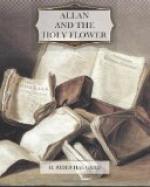So in the end we got back to our huts with gratitude of heart. Indeed, we should have been very happy there for a while, had it not been for our anxiety about Stephen. But it is always thus in the world; who was ever allowed to eat his pot of honey without finding a fly or perhaps a cockroach in his mouth?
In all, Stephen was really ill for about a month. On the tenth day after our arrival at Beza, according to my diary, which, having little else to do, I entered up fully at this time, we thought that he would surely die. Even Brother John, who attended him with the most constant skill, and who had ample quinine and other drugs at his command, for these we had brought with us from Durban in plenty, gave up the case. Day and night the poor fellow raved and always about that confounded orchid, the loss of which seemed to weigh upon his mind as though it were a whole sackful of unrepented crimes.
I really think that he owed his life to a subterfuge, or rather to a bold invention of Hope’s. One evening, when he was at his very worst and going on like a mad creature about the lost plant—I was present in the hut at the time alone with him and her—she took his hand and pointing to a perfectly open space on the floor, said:
“Look, O Stephen, the flower has been brought back.”
He stared and stared, and then to my amazement answered:
“By Jove, so it has! But those beggars have broken off all the blooms except one.”
“Yes,” she echoed, “but one remains and it is the finest of them all.”
After this he went quietly to sleep and slept for twelve hours, then took some food and slept again and, what is more, his temperature went down to, or a little below, normal. When he finally woke up, as it chanced, I was again present in the hut with Hope, who was standing on the spot which she had persuaded him was occupied by the orchid. He stared at this spot and he stared at her—me he could not see, for I was behind him—then said in a weak voice:
“Didn’t you tell me, Miss Hope, that the plant was where you are and that the most beautiful of the flowers was left?”
I wondered what on earth her answer would be. However, she rose to the occasion.
“O Stephen,” she replied, in her soft voice and speaking in a way so natural that it freed her words from any boldness, “it is here, for am I not its child”—her native appellation, it will be remembered, was “Child of the Flower.” “And the fairest of the flowers is here, too, for I am that Flower which you found in the island of the lake. O Stephen, I pray you to trouble no more about a lost plant of which you have seed in plenty, but make thanks that you still live and that through you my mother and I still live, who, if you had died, would weep our eyes away.”
“Through me,” he answered. “You mean through Allan and Hans. Also it was you who saved my life there in the water. Oh! I remember it all now. You are right, Hope; although I didn’t know it, you are the true Holy Flower that I saw.”




